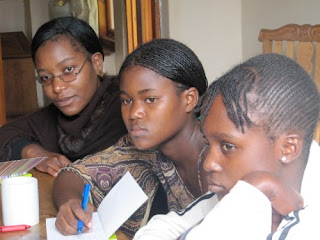
A month ago I returned from a trip to Zimbabwe. I was visiting an amazing young woman, Jennifer Kyker, an ethnomusicologist who has been visiting Zimbabwe for the past fifteen years (since she was fifteen) and has started a nonprofit organization called Tariro, whose mission is to keep orphaned teenage girls in school. She asked me if I would hold a writing workshop for some of the Tariro girls, and I agreed, excited by the idea. But when I began to think about what I might actually teach them in a single two- or three-hour session, I was stymied.
These girls speak English as a second language; they are orphans (mostly due to AIDS); some of them live in huts without water or electricity. They rely on Tariro to pay their school fees, buy their uniforms and texts. Without Tariro it is unlikely they would attend school. In short, these girls are nothing like me, nor like the students I teach at the University of Oregon. I thought long and hard about what I had to offer them and whether I had anything worthwhile to offer them at all.
But I had agreed, and the time came, and there we were, seven Zimbabwean teenagers and me. They are timid girls, on the whole, and I already knew that getting them to speak might be a challenge.
I had made up a “lesson plan” focusing on how to get character onto the page, thinking this might be useful no matter what they were writing. And so we began to talk about how we learn about the people we meet in life, deducing things from speech, from behavior, from appearance. They took an interest and began to talk.
“What can you tell about me from the way I dress?” I asked, urging them to be as candid and specific as possible.
“You are humble,” said Lillian
I laughed. I was wearing dark clothes, no adornments, my hair was pulled back. I suppose I did look humble. Still, the word surprised me.
After our discussion the girls wrote and read aloud their work (you can find their pieces on the blog at http://www.tariro.org/).
Later, I shared Lillian’s comment with Jennifer and the program manager, Fadzi, who is from Zimbabwe. I was slightly embarrassed to report that they’d called me humble. But it turns out, according to Fadzi and Jennifer, that humility, or humbleness, is a prized quality in Zimbabwean culture. This is a culture that values community. To be humble means you think about others, you fit in, you’re a team player. Jennifer and Fadzi said that the word humble is often used in recommendations from teachers.
I cannot imagine using such a word to recommend one of my students unless it was as a postscript to extremely lavish praise. I might praise a student’s drive or ambition or initiative, but to describe a student as humble would seem to be a way of sidelining her, of saying she wasn’t a player.
I would like to step out of my American-ness in this regard. I would like to be able to place humility in higher regard. There are too many individuals stridently hawking themselves in this country: Listen to me! Admire me! Buy my product! My partner, Paul, has written a play called I Hear America Barking which addresses this subject wonderfully.


6 Comments
P.S. I just read Seth's blog, and I totally agree–how can we create without being a little arrogant?
Thank you guys (gals) for responding. There is so much more to be said about this humility thing as it relates to our culture. But I am just putting these thoughts out there–not pretending to draw conclusions.
I was told yesterday, by a friend, about a recent NYTimes article about the death of empathy (world-wide). Unfortunately, I missed it, but will seek it out as it definitely relates to this idea of humility. It seemed to me that in Zimbabwe there was plenty of empathy, but I saw only a two-week snapshot so I am certainly no authority.
But as writers should we not be humble?
Sorry, I forgot to include the link to Seth's post which might be interesting:
http://sethgodin.typepad.com/seths_blog/2010/05/arrogant.html
I really enjoyed reading this. It reminded me of something Seth Godin wrote recently about arrogance. Though he doesn't say it, I think the fear of appearing arrogant is a kind of false or corrupted humility.
BTW, there's a slight typo in that link to the play which prevents it from working correctly (an extra http// minus the colon).
hmmmmmmmm…How can one be humble AND survive in the jungle? And i thought i was the only one who struggled with this notion; how's THAT for humility?
I love this, Cai! What a gift for them, to have you, and for you to have them! Humility is my favorite virtue in others and one I also value in myself (when I'm not being a total asinine ham). Thank you for writing this! I miss you!
Add Comment